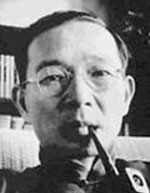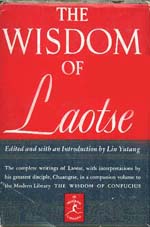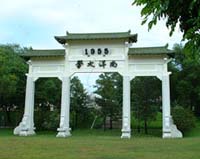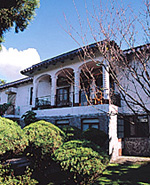Sinological Profiles
Lin Yutang
10 Oct 1895 (Amoy) - 25 Mar 1976 (Hong Kong)Lin Yutang was the next to last of twelve children of a Chinese Presbyterian minister in a small town in the mountains, sixty miles inland from Amoy. He was educated in English at St John's in Shanghai. He studied at Tsinghua University from 1916 to 1919, during which time he encountered his Chinese heritage at its most concentrated.
His later education began in America, specifically at Harvard, where he worked under Bliss Perry and Milton Babbitt in the Comparative Literature Department. His third-person description of himself at Harvard reminds one of Thomas Wolfe's experience in that same library:
In the Widener Library he first found himself, first came alive; never saw a Harvard-Yale football match.
Things became financially tight. Lin's half tuition scholarship had been cut off, he was subsisting on personal loans from back home, and his wife had required surgery for acute appendicitis. The two of them left for France (he received his MA in absentia, in 1920) and Lin went to work for the YMCA, teaching basic literacy to the Chinese workers who had been brought to France during WW1. He discovered in the process the difficulties of mass education, of which in his own way he was to become a master. In 1921, assisted by the devaluation of the mark, he shifted to Leipzig, where he earned a PhD in linguistics in 1923, under Conrady (whose grasp of modern Chinese he found deficient). He returned to China, now fully accredited, as a professor at Peking National University (1923-1926) and Dean of Women's Normal College (1926).
And he wrote. He wrote effectively. His particular blend of sophistication and casualness found a wide audience, and he became a major humorous and critical presence in warlord China. Of the two literary factions in Peking, he headed one, and the other, slightly less opposed to the government, was led by his previous benefactor Hu Shr. He annoyed the warlords. One of them, whom he had ridiculed as the Dogmeat General, put him on a target list of intellectuals. Lin left, taking with him Lu Sywn, one of the writers in his faction, to Amoy University, where Lin became Dean of Arts. Notwithstanding his earlier criticism of the government, he briefly joined the Nationalist Government at Wuhan in 1927 as Secretary to the Foreign Ministry, but, as he later put it,"liked the revolution but got tired of the revolutionists." From the summer of 1927, he abandoned politics and devoted himself to writing for the popular press and editing three literary fortnightlies in Shanghai between 1929 and 1935. His linguistic studies were also done during this relatively quiet period in his life. As a journalist, chiefly in his column The Little Critic from 1930 on, he became famous as the principal voice of independent criticism in China. He further polished an intimate style, "the secret of which is, take your reader into confidence," that was sensationally effective. Pearl Buck became interested, and encouraged him to write a book explaining China to the West. To do this, he retired to the mountains in the summer of 1934. What he brought back from the mountains was the publishing sensation My Country and My People (1935), which hit the top of the New York Times bestseller list.
Following this new path, Lin and his family moved back to America, where he produced a stream of articles for the New York Times and various magazines, and another book, The Importance of Living, in 1937. It was Lin's major statement of personal philosophy, a subject with he had wrestled all his life, and which had come to a focus with his study of Emerson under Emerson expert Bliss Perry. However abrasive Lin might be in advocacy, Lin greatly esteemed charm, and he was sensitive to charm in his own tradition. He thus rendered a Li Yw paragraph on the rules for an ideal home:
"Inside the gate there is a footpath, and the footpath must be winding. At the turning of the footpath there is an outdoor screen, and the screen must be small. Behind the screen, there is a terrace, and the terrace must be level. On the banks of the terrace there are flowers, and the flowers must be fresh. Beyond the flowers is a wall, and the wall must be low. By the side of the wall there is a pine tree, and the pine tree must be old. At the foot of the pine tree there are rocks, and the rocks must be quaint. Over the rocks there is a pavilion, and the pavilion must be simple. Behind the pavilion are bamboos, and the bamboos must be thin and sparse. At the end of the bamboos there is a house, and the house must be secluded. By the side of the house there is a road, and the road must branch off. At the point where the several roads come together there is a bridge, and the bridge must be tantalizing to cross. At the end of the bridge there are trees, and the trees must be tall. In the shade of the trees there is grass, and the grass must be green. Above the grass plot there is a ditch, and the ditch must be slender. At the top of the ditch there is a spring, and the spring must gurgle. Above the spring there is a hill, and the hill must be deep. Below the hill there is a hall, and the hall must be square. At the corner of the hall there is a vegetable garden, and the vegetable garden must be big. In the vegetable garden there is a stork, and the stork must dance. The stork announces that there is a guest, and the guest must not be vulgar. When the guest arrives, there is wine, and wine must not be declined. During the service of the wine, there is drunkenness, and the drunken guest must not want to go home." (p267-268)
It will emerge that the purpose of the home is not for the owner, but for the guest. This fresh way of looking at things, not merely exotic but sophisticated in an unfamiliar way, and formatted as an example of ancient but applicable wisdom, was a revelation to the English general reader. The poet Carolyn Kizer, who was given a copy of The Importance of Living in June 1938, by which time it was in its eleventh printing, not only marked certain passages in the margin, but made her own index of other passages in the back inside cover. Such was its impact on the already literate portion of the public.
WW2 began for China in July 1937, and Lin's subsequent publications sought to increase American support for China. His novel Moment in Peking (1939) gives a searing portrait of the Japanese invaders. With the American entry into the war in 1941, and foreseeing a Western victory, he became a critic of the West as the inevitable architect of the postwar world. This new posture did not sit well with his previous fans. The New York Times, long his friend and principal media channel, found Between Tears and Laughter (1943) to be "shrill, abusive, and vituperative." A return to China, intended to be for the duration of the war, ended after a month when his house in Chungking was destroyed by Japanese bombs. A second visit in late 1943 and early 1944 led to the book Vigil of a Nation, a tour of China at war, and a prediction that communism on the Russian model could never take root in China.
The book did not produce a negative reaction. It produced an uproar. It alienated everyone. It led to a break with Pearl Buck which in turn resulted in Lin's departure from his longtime publisher John Day (a firm owned by Buck's husband, Richard Walsh). For the period of the Chinese civil war that followed the end of WW2, Lin retreated from politics to the past.
In this new emphasis, he still remained a transmitter of the Chinese world to the West, a role which Lin shared with his contemporary Arthur Waley. Like Waley, he passed from extracts (including extracts from Confucius in 1938, plus Laudz and Jwangdz, which had made up several of his previous books) to full-length studies. He began with a biography of the brilliant and insouciant poet Su Dungpwo in 1947, a poet who was continually getting into trouble, in part through criticizing the government, and thus a congenial figure for Lin. He followed this, building on his earlier Laudz and Jwangdz extracts, with a complete Dau/Dv Jing in 1948, adding to its 81 chapters extracts from Jwangdz by way of commentary. Here for the first time he directly confronted Waley, whose complete DDJ had come out in 1934. Lin kept his independence, but he also kept his judgement. In a footnote to a line in DDJ 29, he says "I follow Waley's rendering, which conveys the meaning perfectly." And the first six lines of DDJ 30 conclude with this footnote:
These six lines are by Waley, for they cannot be improved upon.
It is the nod of one master to another. The rest of us get to stand by and watch.
Lin here reached something like his peak as an interpreter of China. He presented a vision of a complete philosophy of life that suited the personal and advocational needs of the moment, rendered with grace, but also accepting responsibility for the larger whole: every word of a major source text. We know of no evidence that Waley was paying attention from across the water. But was it entirely a coincidence that Waley published his full-length study of the circumspect poet Bwo Jyw-yi in 1949?
Concurrently with Lin's shift to antiquity came financial disaster, in a Mark Twain style and on a Mark Twain scale. Since his days in Peking in the 1920's, alert for ways to solve the communication problems which he perceived as keenly as anyone, Lin had envisioned a Chinese typewriter. In 1931 he had tried to have a model built in London. but it had come to nothing. In the middle 1940's, with his book profits to encourage him, he plunged into this project once more. He found a printer in New York to mold the types, and he found a small engineering firm to make the model. Bills mounted, and the antique dealer Loo Chin-tsai loaned Lin tens of thousands of dollars to finish the model. The thing was undeniably ingenious. Its 72-key input allowed the operator to search and combine in order to produce a total of 7,000 characters, on a machine no larger than a regular office typewriter. A press conference was held in August 1947, at Lin's New York apartment. The Times announced the success. George Kennedy of Yale, himself the inventor of a Mandarin shorthand, pronounced the finding system to be "the most efficient yet devised." Y R Chao was convinced. But with China in the midst of civil war, and with no other market available, the typewriter was a colossal failure. Lin's losses were in the neighborhood of $100,000. He was wiped out. At this dire juncture, Lin was offered the Directorship of the Arts and Letters Division of UNESCO. He and his wife sold their New York apartment to pay their debts, and moved to Paris. He found the work frustrating and exhausting, and within months he had left that position (though not before making some wry comments about those with and without administrative talent), and moved to the south of France, where the two of them lived in extreme simplicity, growing potatoes on their terrace, and putting Lin's pen to work to rebuild their fortunes.
From this placid existence, Lin was called to Singapore in 1954 to be Chancellor of the newly founded but not yet operational Nanyang University. For all the warning implicit in his administrative experiences in Paris, the temptation was great. Lin thought big. Nanyang to him was a second chance at a noncommunist China, outside the reach of the regime in Peking; a place of civilized leisure and contemplation, where pipes might be smoked and quiet discussions held. He set out to build it. He offered his prospective faculty perquisites far beyond the ability of the University's budget to supply. In the process, he angered the ordinary Malaysians, from rickshaw pullers to businessmen, who were volunteering the funds for its establishment. He tried to recruit Han Suyin as a professor of English Literature. She wanted to make a new Asian literature, not teach Dickens. She offered to come on board as the school's physician. Lin announced her appointment the following day as a professor of English. It was separately alleged that communist students, masterminded from Peking, were intimidating all others, and poisoning the atmosphere. The situation rapidly dissolved, and Lin returned to France in 1955 after less than six months on the job, with the University not yet formally open.
Later the Lins were able to move back to New York, to be near their daughters. Lin was persuaded in 1959 by his wife, who unlike himself had remained a Christian through the intervening years, to attend her church, the Madison Avenue Presbyterian. He became interested. He rejoined the Church, and, convinced that this was a matter of public interest, published From Pagan To Christian in that same year. The move had its sympathizers, but it cemented forever the disdain in which Lin is still held by American academics.
But there were nice moments. One of them provided the opening scene for the Preface of Lin's next book, The Importance of Understanding (1960), in which he reverted to summarizing China for America:
"It was one of those evenings. We had invited the Langs and the Targs. My wife knew that Lang was a gourmet and that she could not get away with just a good home-cooked dinner. She produced a pike covered with seaweed and scallop sauce which even I had not tasted in my life. Targ, I knew, was a bibliophile, interested in the bouillabaisse of old editions. What I did not know was that Targ was also a gourmet and Lang also a bibliophile, a collector of medieval scripts. The latter had brought me a 1708 edition of an antique French volume instead of a box of chocolates. When this happens, conversation goes very fast. Targ and Lang started talking about the history of the sauce Béarnaise and How To Cook a Wolf by M F K Fisher. And Targ wanted to know if I could borrow or steal a copy of old Giles's Chinese Biographical Dictionary which he had read about in one of E V Lucas's novels and had been looking for all his life. I do now know what wine we had, but it was not Chablis." (The Importance of Understanding, 13)
Lin and his wife moved in 1965 to Taiwan, where Adet, the oldest of his three daughters, had a job with the Palace Museum. A residence, which he designed for himself, was built for him in Yangmingshan:
Of it he once said, perhaps with Li Yw in mind:
"On the premises there is a garden. In the garden there is a house. In the house there is a courtyard. In the courtyard there is a tree. Above the tree there is sky. In the sky there is a moon. What a fortunate man I am!"
In 1969 he was made President of the Taibei Chinese Center of International PEN. His column in Chinese ("Wo swo Bu tan") had five million readers. But the sense of fortune was presently to be shattered. Adet, presumably in despair over a failed marriage, hanged herself on the Palace Museum grounds. Her note said, "Forgive me, I can't live on. My heart is spent. I love you so much." Lin thenceforth spent most of his time in Hong Kong, where his second daughter Anor was chief of the Hong Kong bureau of the Reader's Digest, and his third daughter, Meimei, was a biochemist at Queen Mary Hospital. He still continued, with his customary energy, his cultural bridgebuilding efforts, and in 1972, following years of support by the Chinese University of Hong Kong and years of work by a small editorial staff in Taibei, there appeared his Chinese-English Dictionary of Modern Usage. He and the world considered it his crowning achievement.
His 80th birthday, 10 October 1975, was marked by celebrations in both Hong Kong and Taibei. His daughter Taiyi (Anor) recalls:
When I met my parents at the Hong Kong airport upon their return, Father's eyes shone with gladness. His cup was full. The only honor that he wanted and had not received was the Nobel Prize [for which he had been nominated in 1972 and again in 1973]. But he was his philosophical self about it. "Let us be reasonable," he said. "We must have an attitude of expecting neither too much nor too little from life."
Nearing the end, he wrote "Memoirs of an Octogenarian," a slight pamphlet published in Taibei in 1975. It contains his own valedictory address to the world:
"There comes a time in our lives, as nations and as individuals, when we are pervaded by the spirit of early autumn, in which green is mixed with gold and sadness is mixed with joy, and hope is mixed with reminiscence. There comes a time in our lives when the innocence of spring is a memory and the exuberance of summer a song whose echoes remain faintly in the air, when as we look out on life, the problem is not how to grow but how to live truly, not how to strive and labor but how to enjoy the precious moments we have, not how to squander our energy but how to conserve it in preparation for the coming winter. A sense of having arrived somewhere, of having settled and having found out what we want. A sense of having achieved something, precious little compared with its past exuberance, but still something, like an autumn forest shorn of its summer glory, but retaining such of it as will endure."
Something indeed endures. Lin's character input system, coming into its own as the computer age matured, was purchased in 1985 by the Mitac Automation Company of Taiwan. His English-language works explaining China, translated by others into Chinese, have a steady second public. His dictionary enjoys the esteem of some linguists. His house in Yangmingshan is now the Lin Yutang Memorial Library. But neither China nor the world, in his lifetime, ever quite found a home or a use for him. It is their loss.
E Bruce Brooks
References
- Lin Yutang. Memoirs of an Octogenarian. Mei Ya 1975
- Ryan M Murray. Lighting a Candle and Cursing the Darkness. 10 Dec 1999
- American National Biography page
- Lin Yutang page (includes a downloadable version of Ryan Murray's biography)
- Lin Yutang Dictionary (1972 edition) at Chinese University of Hong Kong
9 June 2004 / Contact The Project / Exit to Sinology Page




